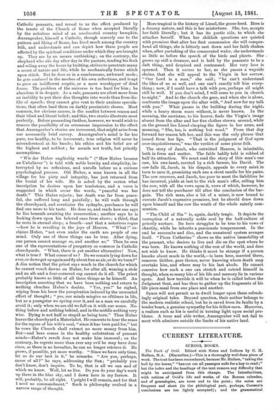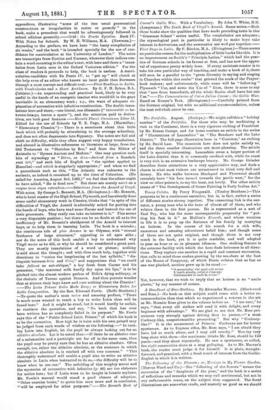CURRENT LITERATURE.
SCHOOL BOOKS.
The Pesti of Ovid. Edited with Notes and Indices by G. H. Hallam, M.A. (Macmillan.)—This is a thoroughly well-done piece of work. The text has been renumbered, because Mr. Hallam, "taking the bull by the horns," "has cut out all passages unfit for a boy to read;" but the index and the headings of the text remove any difficulty that might be anticipated from this change. The Introductions, with notices of Ovid's life and works, of the Roman calendar, and of genealogies, are terse and to the point ; the notes are frequent and short (in the philological part, perhaps, Corssen'a conclusions are too lightly accepted); and the grammatical appendices, illustrating "some of the less usual grammatical constructions or irregularities in metre or prosody" in the book, make a precedent that would be advantageously followed in school editions generally.—Ovid : the Pontie Epistles. Book IV. With Notes for Schools. By W. H. Williams, M.A. (Newman.)— According to the preface, we have here "the hasty compilation of six weeks," and the book "is intended specially for the use of can- didates for matriculation at the University of London." The notes are transcripts from Curtius and Corssen, wherever their indices con- tain a word occurring in the editor's text, with here and there a" trans- lation from Latin note in the Oxford Variorum edition." For the class of readers it pretends to help, the book is useless. A matri- e ulation-candidate with Ex Ponto IV. to "get up" will clutch at the help even of an editor who knows no later guide than Barmann through a most corrupt and difficult text.—First Readings in Latin, with Vocabularies and a Short Accidence. By G. F. H. Sykes, B.A. (Isbister.)—An unpretending and practical book, likely to be very useful in the hands of an energetic teacher who would fill in the gaps inevitable in an elementary work ; e.g., the want of adequate ex- planation of accusative with infinitive construction. The double trans- lations here and there,—one literal, one idiomatic (" intermittit =- be- tween-lets-go, leaves a space"), and the attention paid to deriva- tives, 8113 both good features.—Horatii Flacei Carminum Liber Edited for the use of Schools by T. E. Page, M.A. (Macmillan; "Elementary Classics.")— There is a smartness about this little book which will probably be stimulating to the average schoolboy, and does not often degenerate into flippancy. The notes are full and shirk no difficulty, while they often suggest very happy translations, and abound in illustrative references to literature at large, from the Old Testament to "Sketches by Boz," and from the Ethics of Aristotle to "Hymns Ancient and Modern." One may question such bits of etymology as "Divas, or dies—derived from a Sanskrit root mv," and such bits of English as "the epithet applied to Hannibal—and which is singularly appropriate ;" and when we find a parenthesis such as this, "The Atlantic was unknown to the ancients, as indeed it remained up to the time of Columbus. (He sailed for America, August 3rd, 1492,)" we feel that the editor ought to have added, "He is dead now." But these are merely naevi on a corpus teres atque rotundum.—Selections from the Aeneid of Vergil. With notes. By George L. Bennett, M.A. (Rivingtons.)—Mr. Bennett, who is head master of the High School, Plymouth, and has already done some useful elementary work in Classics, thinks that "in spite of the difficulties of Virgil, the Aeneid is admirably suited for putting into the hands of boys, who have read some Caesar and learned the use of their grammars. They really can take an interest in it." This seems a very disputable position ; but there can be no doubt at all as to the inefficiency of Mr. Bennett's abridgment of the Aeneid to interest boys, or to help them in learning Latin. The book is a mistake, the continuous tale of pies Aeneas is no Odyssee, with "eternal freshness of large utterance," appealing to all ages alike ; nor do the notes of this book enable a boy to understand why Virgil wrote as he did, or why he should be considered a great poet. They are mostly translations of a word or phrase ; nothing is said about the thought; and with thus much help, together with directions to "notice the lengthening of the last syllable," " dis- tinguish between /evis and Weis," and suggestions that "we could take falleret as sub-oblique," a boy fresh from Caesar and his grammar, "the maternal milk hardly dry upon his lips," is to be pitched into the almost modern pathos of Dido's dying soliloquy, or the rhetoric of Turrins against Drances. And then parents wonder that at sixteen their boys know and care nothing about the Classics ! —The Latin Primer Rules Made Easy ; or Elementary Rules for Latin Composition. By the Rev. Edmund Fowle. (Relfe Brothers.) —To quote the author's most naive and amusing preface, "There is much more wanted to teach a boy to write Latin than will be found here." And it might be cruel, but it would hardly be unfair, to continue the quotation, and say, "No book that has ever been written has so completely failed in its purpose." Mr. Fowle says this of the "Public School Latin Primer," of which his book is to be the corrective. How high he is hoist with his own petard may be judged from such words of wisdom as the following :—" In turn- ing Latin into English, let the pupil be always looking out for an ablative absolute. Let it be noted thus :—If there be an ablative case of a substantive and a participle not far off in the same case, then the pupil may be pretty sure that he has an ablative absolute. Often enough, too, either the ablative absolute, or the sentence in which the ablative absolute is, is marked off with two commas." "This thoroughly understood will enable a pupil also to write an ablative absolute in Latin when instructed to do so,—the difficulty will be to know when to use one." The unfolding of this weighty secret and the mysteries of accusative with infinitive (p. 46) are too elaborate for notice here; but if Latin were to be taught in lunatic asylums, Mr. Fowle's manual would stand a good chance of adoption. "Other exercise books," to quote him once more and in conclusion, " will be employed for other purposes."—The Seventh Book of Caesar's Gallic War. With a Vocabulary. By John T. White, D.D. (Longmans.) The Tenth Book of Virgit's Aeneid. Same series.—Both these books show the qualities that have made preceding texts in this "Grammar School" series useful. The vocabularies are adequate ; the etymological part in particular is likely to make boys take interest in derivations, and the summaries are well put together.— First Steps in Latin. By F. Ritchie, M.A. (Rivingtons.)—There seems no particular reason for the multiplication of little books like this. It is no improvement on Smith's " Principia Latina," which had the prac- tice of German schools in its favour at first, and has now the appro- val of experience pretty widely here. If every assistant-master is to take his own particular way of teaching, and make a book of it, there will soon be a parallel to the "great diversity in saying and singing in Churches within this realm" that grieved the souls of the Prayer. book makers ; and unfortunately, while some will be " following " Plymouth "Use, and some the Use of " Eton, there is none to say that "now from henceforth, all the whole Realm shall have but one Use."—The Commentaries of Califs Julius Caesar : the Gallic War. Based on Kraner's Text. (Rivingtons.)—Carefully printed from the German original, but with no additional recommendation, unless the neat red-cloth cover be one.































 Previous page
Previous page